June 25, 2025 | 19:09 GMT +7
June 25, 2025 | 19:09 GMT +7
Hotline: 0913.378.918
June 25, 2025 | 19:09 GMT +7
Hotline: 0913.378.918
On May 11, the Ministry of Agriculture and Rural Development (MARD) coordinated with the People's Committee of Tay Ninh province to organize a conference to develop disease-free livestock production chains.
According to the Department of Animal Health (DAH), since the beginning of 2023, the whole country has had 7 outbreaks of avian influenza A/H5N1. The total number of infected, dead and discarded poultry was 9,604.
Currently, there has been no avian influenza outbreak for less than 21 days. The outbreaks are caused by virus A/H5N1 scattered in the Northeast and Central provinces, mainly occurring in small poultry households which have not been vaccinated against avian influenza.
The localities have detected and handled it in a timely manner to prevent the spread of avian influenza. Compared to the same period in 2022, the epidemic area and epidemic level both decreased. The number of outbreaks decreased by more than 61%, the number of provinces and cities with epidemics decreased by 50%, and the number of discarded poultry decreased by 82%.
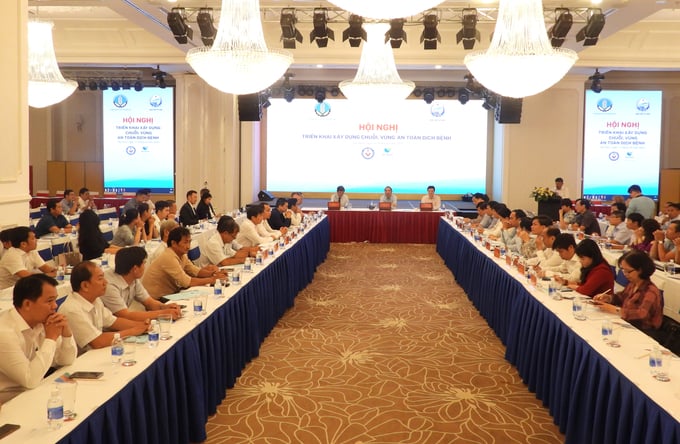
Overview of the conference. Photo: Tran Trung.
The whole country currently has 2,230 livestock production facilities and areas in 55 provinces and cities certified as disease-free, including 922 poultry production facilities and areas; 1,133 pig-raising establishments, and 175 other livestock-raising establishments.
Since the start of 2023, 102.8 million doses of avian influenza vaccine have been provided by enterprises; 58 million doses are being stored at the warehouse. Expected production and import in the second quarter of the year is 133.8 million doses, ensuring to meet the demand for disease prevention, vaccination, siege vaccination and epidemic prevention.

Veterinarians instruct poultry farmers on disease safety. Photo: Tran Trung.
Mr. Nguyen Van Long, Director of the Department of Animal Health, said that in the past time the Ministry of Agriculture and Rural Development and localities have directed the implementation organization and achieved some very important results. “First of all, we have very well controlled the disease situation in poultry all over the country, there are only a few small outbreaks, and the vast majority (over 99.9%) of the total flock of over 550 million poultry is absolutely safe from all kinds of diseases”.
The provinces in the Southeast region with the leading livestock production rate in the country have established very good disease-free livestock production chains. Vietnam now has over 920 facilities and epidemic-free areas.
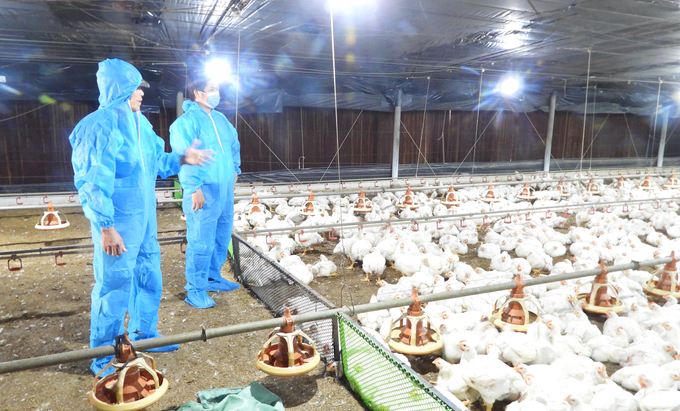
Chicken farmers implementing disease safety solutions. Photo: Tran Trung.
But in the view of the DAH Director, the missions are far from over. “We need to stay focused and make sure to control the diseases well, preventing them from occurring on a large scale, especially in areas qualified for disease safety standards. We have achieved disease safety according to Vietnam's standards, but promoting exports to other countries means that we must upgrade our disease-free areas to the standards of the World Organization for Animal Health (OIE)”.
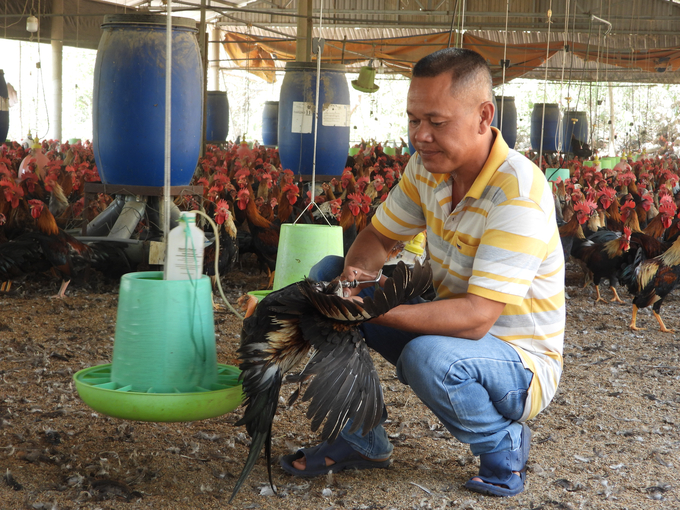
Poultry production across Vietnam experienced stable development in the first quarter of 2023. Photo: Tran Trung.
Deputy Minister of Agriculture and Rural Development Phung Duc Tien assessed that the prevention and control of livestock and poultry diseases have achieved many important results.
But concerning the risk of disease, It is impossible not to take precautions. The construction of facilities and disease-free areas in recent times is still limited. The Deputy Minister therefore suggested that the provinces and cities based on the programs and plans approved by the Prime Minister as well as directive documents of the MARD to develop specific plans for implementation.
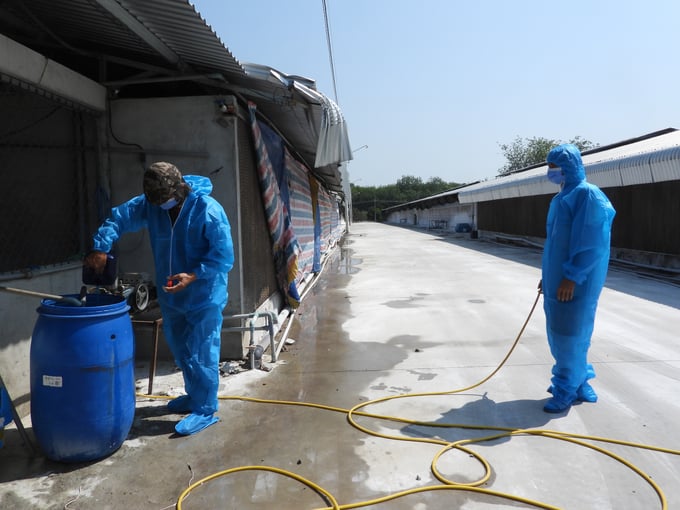
Enterprises and breeders take the initiative in implementing disease-free breeding solutions. Photo: Tran Trung.
"We need to set goals in terms of time, quality and results to achieve. At least 4 districts by 2025 and 10 districts by 2030 will be certified disease-free according to the standards of the World Organization for Animal Health.
“In order to do so, provinces and cities are required to direct specialized agencies, localities and businesses operating in the vicinity to carefully study the regulations of the World Organization for Animal Health as well as the requirements of importing countries, develop specific plans and organize the construction of export-oriented disease-free breeding chains," said the Deputy Minister.
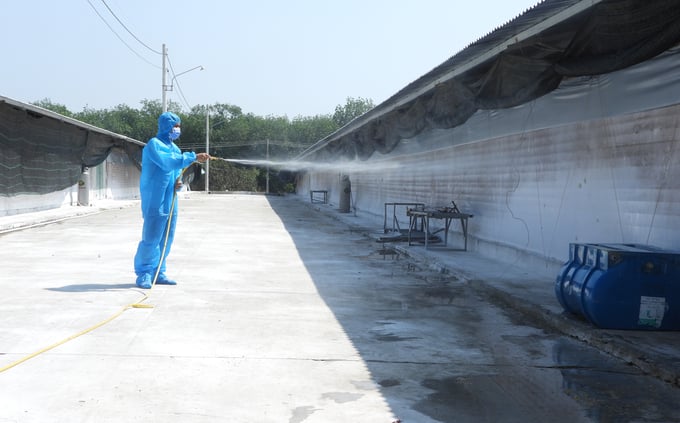
According to Deputy Minister Phung Duc Tien, the construction of facilities and disease-free areas in recent times is still limited. Photo: Tran Trung.
Deputy Minister Phung Duc Tien assigned the Department of Animal Health to execute a number of tasks:
Provide guidance and support to livestock enterprises and localities to successfully build livestock production chains and disease-free areas with the aim to export animals and animal products;
Organize training on regulations, expertise and techniques in the process of building the chain and disease-free areas;
Issue specific technical criteria for each component of the disease-free production chain so that relevant units can have a basis for application, self-inspection and evaluation during the implementation of the plan;
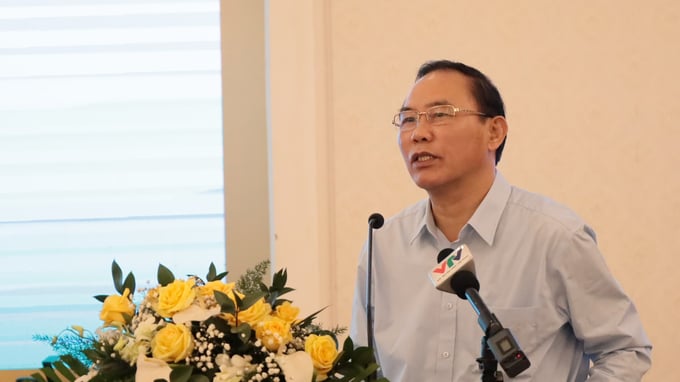
Deputy Minister of Agriculture and Rural Development Phung Duc Tien speaking at the conference. Photo: Tran Trung.
Provide assistance in the implementation of technical measures in the construction of livestock, slaughter and processing facilities that meet the standards of the World Organization for Animal Health and the requirements of target markets;
Coordinate with relevant units to ensure the successful construction of the disease-free production chain in accordance with the regulations of the World Organization for Animal Health so that animals and animal products can be exported to other countries.
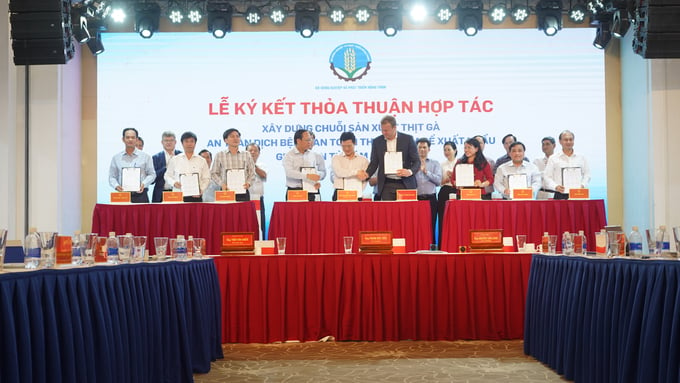
Representatives of the Departments of Agriculture and Rural Development of provinces located in the southern key economic region and De Heus Co., Ltd. signed a cooperation agreement to build a export chicken meat production chain. Photo: Tran Trung.
Within the framework of the conference, under the witness of Deputy Minister of Agriculture and Rural Development Phung Duc Tien, representatives of leaders of the Departments of Agriculture and Rural Development of provinces located in the southern key economic region and De Heus Co., Ltd. signed a cooperation agreement to build a disease-free, food-safe chicken production chain for export in the 2023 - 2028 period.
Translated by Samuel Pham
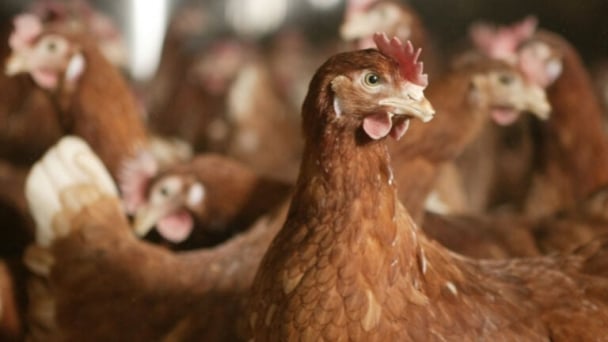
(VAN) Research has shown that Hy-Line brown hens may be better suited for cage-free production based on overall greater egg production and other quality metrics.
![Turning wind and rain into action: [9] Digitizing hydrometeorological data in response to climate change](https://t.ex-cdn.com/nongnghiepmoitruong.vn/608w/files/news/2025/06/17/z6704423696987_15fd32ffc26d590d204d520c9dac6786-nongnghiep-165943.jpg)
(VAN) Farmers have begun accessing hydrometeorological applications to adjust their cropping schedules, aiming to ensure productivity and adapt to climate change.
![Turning wind and rain into action: [8] Real-time salinity detection and early warning technology](https://t.ex-cdn.com/nongnghiepmoitruong.vn/608w/files/news/2025/06/17/z6704423696987_15fd32ffc26d590d204d520c9dac6786-nongnghiep-151127.jpg)
(VAN) Thanks to the integration of modern hydrological-hydraulic models, remote sensing technologies, and artificial intelligence, the accuracy of hydrological forecasting has significantly improved.
![Turning wind and rain into action: [7] Early disaster warnings help marine farmers minimize losses](https://t.ex-cdn.com/nongnghiepmoitruong.vn/608w/files/news/2025/06/17/z6704423696987_15fd32ffc26d590d204d520c9dac6786-nongnghiep-142942.jpg)
(VAN) In recent years, thanks to early disaster warnings and forecasting, marine farmers in Khanh Hoa province have been able to reduce risks and losses, thereby improving production efficiency.
![Turning wind and rain into action: [6] ‘Four on-the-spot’ disaster management software](https://t.ex-cdn.com/nongnghiepmoitruong.vn/608w/files/news/2025/06/17/e5a48259d6a262fc3bb3-nongnghiep-183800.jpg)
(VAN) By simply activating the scenario on the disaster management software, the relevant authorities immediately know how many households need to be evacuated, where to evacuate them to, and by what means of transportation…
![Turning wind and rain into action: [5] Hue applies modern technology in disaster forecasting](https://t.ex-cdn.com/nongnghiepmoitruong.vn/608w/files/news/2025/06/17/z6704423696987_15fd32ffc26d590d204d520c9dac6786-nongnghiep-093938.jpg)
(VAN) In Hue city, modern technology has recently been applied in meteorological and hydrological forecasting and warning, helping to reduce the damage caused by natural disasters.

(VAN) A cutting-edge farming technique being implemented on an experimental ranch in Arizona's Sonoran Desert has already saved a billion gallons of water over five years, according to Civil Eats.